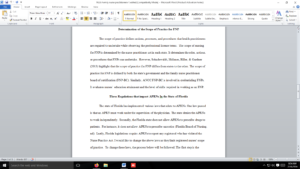Advanced practice registered nurses
Professional Roles and Responsibilities”
Family nurse practitioners (FNPs) are graduate-educated, nationally-certified and state licensed advanced practice registered nurses (APRNs) who care for medically stable patients across the lifespan, from infants to geriatric patients.
Share your thoughts
- What are the educational requirements to practice as a FNP?
- According to the American Association of Colleges of Nursing (AACN), what is the recommended terminal degree to prepare nurse practitioners.
- Who determines the scope of practice for FNPs?
- Who defines it? Who Credentials and what is the role of a Professional and Political Organization in defining the role?
- Review the following website:
https://floridasnursing.gov/
Discuss at least 3 regulations impose in APRN in the state of Florida and would you like to change and what process will you use to do it?.
Answer preview
The scope of practice defines actions, processes, and procedures that health practitioners are required to undertake while observing the professional license terms. The scope of nursing for FNP is determined by the nurse practitioner act in each state. It determines the roles, actions, or procedures that FNPs can undertake. However, Schadewaldt, McInnes, Hiller, & Gardner (2013) highlight that the scope of practice for FNP differs from states to the other. The scope of practice for FNP is defined by both the state’s government and the family nurse practitioner board of certification (FNP-BC). Similarly, ANCC FNP-BC is involved in credentialing FNPs. It evaluates nurses’ education attainment and the level of skills required in working as an FNP.
[857 Words]
Advanced practice registered nurses


